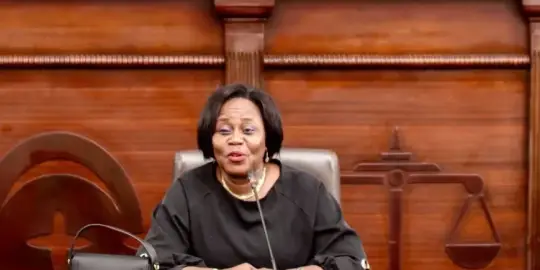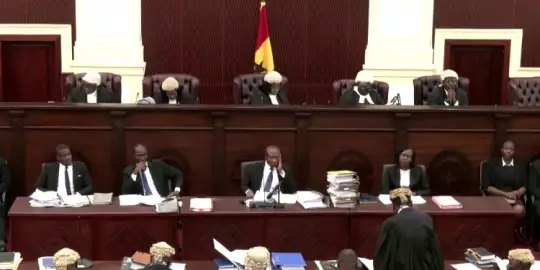
On Tuesday, November 12, 2024, the Supreme Court of Ghana will deliver a landmark judgment concerning a controversial decision by Speaker of Parliament Alban Bagbin to declare four parliamentary seats vacant. This decision has sparked a significant legal dispute, as Bagbin's move, which he justified as a response to alleged constitutional violations by four Members of Parliament (MPs), is seen by some as an overreach of his powers.
The case was brought before the court by Alexander Afenyo-Markin, the leader of the New Patriotic Party (NPP) parliamentary caucus, who argues that Bagbin's declaration of the seats as vacant bypassed necessary judicial procedures. According to Afenyo-Markin, the Speaker does not have the authority to interpret constitutional matters or make determinations on parliamentary vacancies without judicial oversight. He contends that this responsibility belongs exclusively to the judiciary and that Bagbin's actions denied the affected MPs and their constituents due process.

The dispute centers on Bagbin's interpretation of the 1992 Constitution, which he believes grants him the authority to declare parliamentary seats vacant if MPs fail to meet specific constitutional requirements. Bagbin's announcement, made on October 17, 2024, was based on his assertion that the four MPs had breached certain provisions of the Constitution, warranting their removal from office. However, Afenyo-Markin maintains that Bagbin acted unilaterally, which he believes not only exceeds the Speaker's constitutional authority but also disenfranchises the constituents of the affected MPs, as they are left without proper representation in Parliament.
At the last court session, a procedural complication arose. Thaddeus Sory, the legal counsel for Speaker Bagbin, was absent, and no formal statement of case from the Speaker was submitted to the court. This absence was notable as it came amid the Attorney-General's challenge to Sory's continued representation of Bagbin. The Attorney-General argued that Sory's appointment lacked the necessary approval from the Public Procurement Authority, raising questions about the legality of Bagbin's legal representation in this matter.
To prevent any further actions that could affect the disputed parliamentary seats, the Supreme Court had earlier issued an injunction. This ruling halted Bagbin's declaration of the seats as vacant until the court could reach a final decision on the matter. In response, Speaker Bagbin filed a motion to reverse the injunction, arguing that his declaration was an essential part of his duties to maintain the integrity of Parliament. He asserted that the Supreme Court's injunction hindered his responsibilities as Speaker and prevented him from addressing issues related to parliamentary discipline and accountability.

However, the Supreme Court ultimately dismissed Bagbin's request to lift the injunction, maintaining its original position that no further actions should be taken concerning the vacant seats until a conclusive judgment was reached. This decision effectively preserved the status quo until the court could deliberate and rule on the matter's constitutional implications.
As the Supreme Court prepares to issue its final judgment, the case has garnered significant attention due to its potential impact on Ghana's parliamentary procedures and constitutional interpretation. The court's ruling is expected to clarify the extent of the Speaker's authority in handling parliamentary vacancies and delineate the judiciary's role in interpreting constitutional mandates. The outcome will likely influence future interactions between the executive, legislative, and judicial branches of government, particularly concerning the balance of power within Ghana's democratic system.
In essence, this ruling could redefine the relationship between the Speaker of Parliament and the judiciary in Ghana, setting a precedent for how constitutional disputes within Parliament are handled and establishing clearer boundaries regarding parliamentary authority and judicial oversight.





No comments yet
Be the first to share your thoughts!